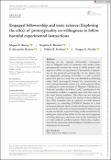Files in this item
Engaged followership and toxic science : exploring the effect of prototypicality on willingness to follow harmful experimental instructions
Item metadata
| dc.contributor.author | Birney, Megan | |
| dc.contributor.author | Reicher, Stephen D. | |
| dc.contributor.author | Haslam, S. Alexander | |
| dc.contributor.author | Steffens, Niklas | |
| dc.contributor.author | Neville, Fergus G. | |
| dc.date.accessioned | 2022-11-17T13:30:04Z | |
| dc.date.available | 2022-11-17T13:30:04Z | |
| dc.date.issued | 2023-04-01 | |
| dc.identifier | 282171376 | |
| dc.identifier | 29c052c4-86a6-437c-b1e0-09e35300853b | |
| dc.identifier | 85142271307 | |
| dc.identifier | 000884588200001 | |
| dc.identifier.citation | Birney , M , Reicher , S D , Haslam , S A , Steffens , N & Neville , F G 2023 , ' Engaged followership and toxic science : exploring the effect of prototypicality on willingness to follow harmful experimental instructions ' , British Journal of Social Psychology , vol. 62 , no. 2 , pp. 866-882 . https://doi.org/10.1111/bjso.12603 | en |
| dc.identifier.issn | 0144-6665 | |
| dc.identifier.other | ORCID: /0000-0001-7377-4507/work/123196876 | |
| dc.identifier.uri | https://hdl.handle.net/10023/26425 | |
| dc.description | Funding: This research was supported by Economic and Social Research Council grant (ES/L003104/1), a Fellowship from the Australian Research Council (FL110100199), from funding received from the School of Management at the University of St Andrews. | en |
| dc.description.abstract | Drawing on the ‘engaged followership’ reinterpretation of Milgram’s work on obedience, four studies (three of which were pre-registered) examine the extent to which people’s willingness to follow an experimenter’s instructions is dependent on the perceived prototypicality of the science they are supposedly advancing. In Studies 1, 2 and 3, participants took part in a study that was described as advancing either ‘hard’ (prototypical) science (i.e., neuroscience) or ‘soft’ (non-prototypical) science (i.e., social science) before completing an online analogue of Milgram’s ‘Obedience to Authority’ paradigm. In Studies 1 and 2, participants in the neuroscience condition completed more trials than those in the social science condition. This effect was not replicated in Study 3, possibly because the timing of data collection (late 2020) coincided with an emphasis on social science’s importance in controlling COVID-19. Results of a final cross-sectional study (Study 4) indicated that participants who perceived the study as to be more prototypical of science found it more worthwhile, reported making a wider contribution by taking part, reported less dislike for the task, more happiness at having taken part, and more trust in the researchers, all of which indirectly predicted greater followership. Implications for the theoretical understanding of obedience to the toxic instructions of an authority are discussed. | |
| dc.format.extent | 17 | |
| dc.format.extent | 1049542 | |
| dc.language.iso | eng | |
| dc.relation.ispartof | British Journal of Social Psychology | en |
| dc.subject | Milgram | en |
| dc.subject | Engaged followership | en |
| dc.subject | Toxic behaviour | en |
| dc.subject | Social identity | en |
| dc.subject | Obedience | en |
| dc.subject | BF Psychology | en |
| dc.subject | 3rd-DAS | en |
| dc.subject | MCC | en |
| dc.subject.lcc | BF | en |
| dc.title | Engaged followership and toxic science : exploring the effect of prototypicality on willingness to follow harmful experimental instructions | en |
| dc.type | Journal article | en |
| dc.contributor.sponsor | Economic & Social Research Council | en |
| dc.contributor.institution | University of St Andrews. School of Psychology and Neuroscience | en |
| dc.contributor.institution | University of St Andrews. School of Management | en |
| dc.identifier.doi | https://doi.org/10.1111/bjso.12603 | |
| dc.description.status | Peer reviewed | en |
| dc.identifier.grantnumber | ES/L003104/1 | en |
This item appears in the following Collection(s)
Items in the St Andrews Research Repository are protected by copyright, with all rights reserved, unless otherwise indicated.

